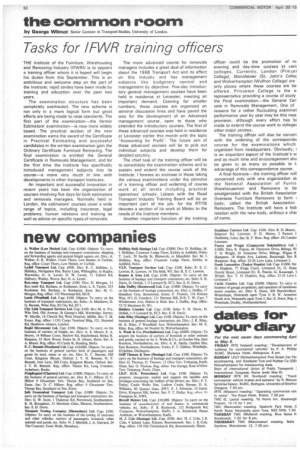Tasks for IFWR training officers
Page 54

If you've noticed an error in this article please click here to report it so we can fix it.
THE Institute of the Furniture, Warehousing and Removing Industry {IFVVRI) is to appoint a training officer whom it is hoped will begin his duties from this September. This is an ambitious and welcome step on the part of the Institute; rapid strides have been made by training and education over the past two years.
The examination structure has been completely overhauled. The new scheme is not only in a more logical form but great efforts are being made to raise standards. The first part of the examination-the former Estimators' examination is now more widely based. The practical section of the new examination earns the award of the Certificate in Practical Estimating and successful candidates in the written examination.gain the Ordinary Certificate Furniture Removing. The final examination is entitled the General Certificate in Removals Management, and for the first time the institute has specifically introduced management subjects into its course-a move very much in line with developments in other transport institutes.
An important and successful innovation in recent years has been the organization of courses involving five days for both estimators and removals managers. Normally held in London, the estimators' courses cover a wide range of topics, including insurance, legal problems, human relations and training as well as advice on specific types of removals.
The more advanced course for removals managers includes a great deal of information about the 1968 Transport Act and its effect on this industry and has management subjects like budgetary control and management by objective. Five-day introductory general management courses have been held in residence at Leicester, meeting an important demand. Catering for smaller numbers, these courses are organized on seminar discussion lines and have paved the way for the development of an Advanced management course, open to those who attended the introductory courses. The first of these advanced courses was held in residence at Leicester earlier this month with the topic -Accounting for Profit-. The future aim of these advanced courses will be to pick out individual subjedts and develop them for detailed scrutiny.
The chief task of the training officer will be to consolidate the examination scheme and to sustain and extend the course work of the Institute. I foresee an increase in those taking the various examinations under the stimulus of a training officer and widening of courses work at all levels including practical operatives' schools. Liaison with the Road Transport Industry Training Board will be an important part of the job, for the RTITB devotes a section of its work at Motec to the needs of the Institute members.
Another important function of the training
officer could be the promotion of m evening and day-time courses at varic colleges. Currently, London (Prince1 College), Manchester (St. John's Collec and Wolverhampton (Wulfrun College) are only places where these courses are be offered. Princeton College is the sl representative providing a course of study the Final examination-the General Cer cate in Removals Management. One of reasons for a rather fluctuating examine/ performance year by year may be this mea provision, although every effort has IN made to extend the course work to college: other major centres.
The training officer will also be concert with the widening of the correspondei course for the examinations which organized from headquarters. Obviously, 1 is an important aspect of the Institute's w and as much time and encouragement she be given to as many as possible to t advantage of this correspondence course.
A final footnote-the training officer will concerned only with one organization si the National Association of Furnit Warehousemen and Removers is be amalgamated with the British Associatior Overseas Furniture Removers to form body, called the British Association Removers. The Institute will have a fedi relation with the new body, without a chai of name.




























































































